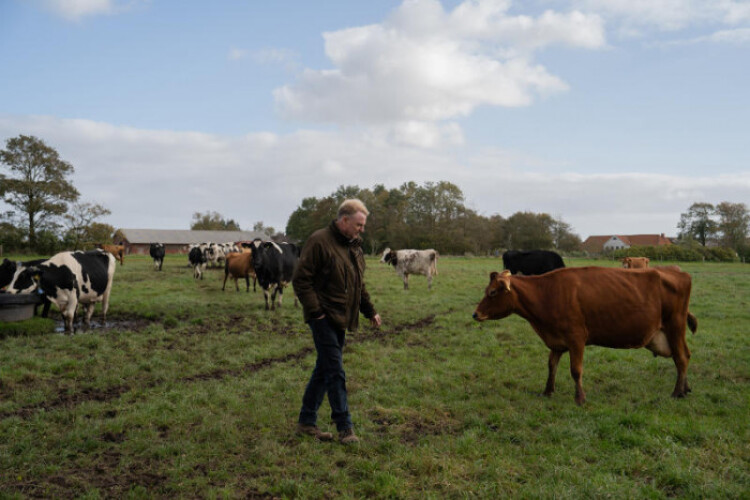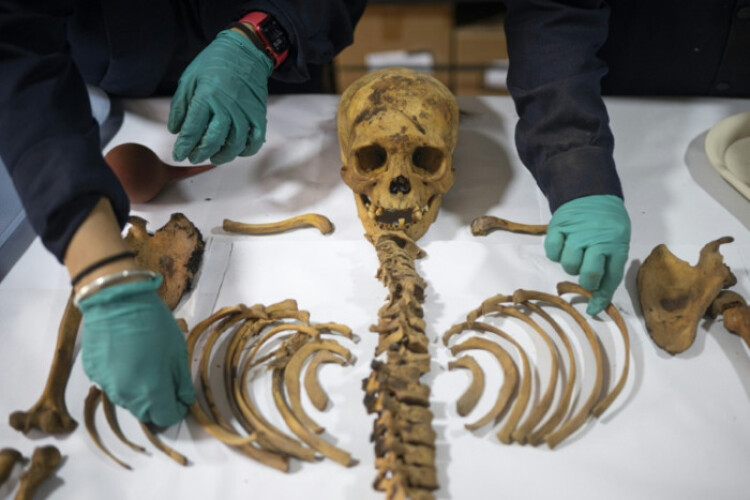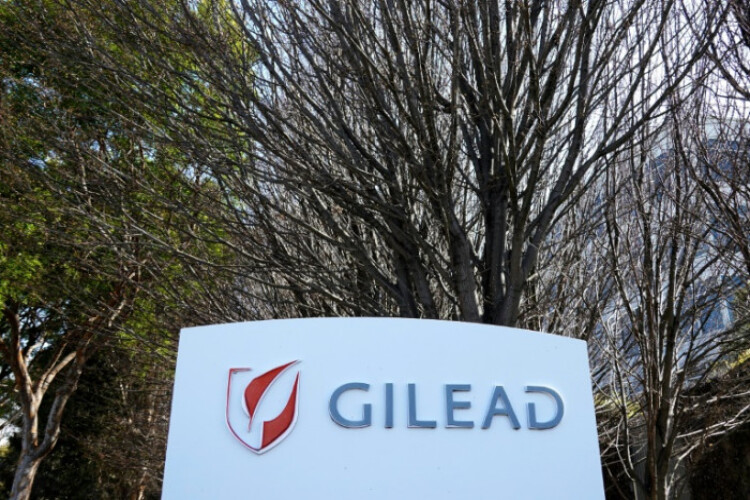
COPENHAGEN, Denmark — Denmark, known for its inventive restaurants and elegant design studios, is about to become known for something more basic: the world’s first belch and manure tax.
That’s because there are five times as many pigs and cows in Denmark as there are people. Nearly two-thirds of its land is taken up by farming. And agriculture is becoming its largest share of climate pollution, putting lawmakers under intense public pressure to reduce it.
So now, Denmark’s unlikely coalition government, made up of three parties from across the political spectrum, has agreed to tax the planet-heating methane emissions that all those animals expel through their poop, farts and burps. The measure, under negotiation for years, was passed by the Danish parliament last month, making it the only such climate levy on livestock in the world.
“I think it’s good,” said Rasmus Angelsnes, 31, who was shopping for dinner in Copenhagen one recent afternoon. “It’s kind of a nudge to make different choices, maybe more climate-friendly choices.”
Never mind that his shopping cart contained thick slices of pork belly, which he planned to cook that rainy evening with potatoes and parsley. “Comfort food,” he said sheepishly.
The tax is part of a larger package designed to clean up the country’s agricultural pollution and eventually restore some farmland to its natural form, like peat lands, which are exceptionally good at locking away planet-heating gases underground but were drained decades ago to grow crops.
Denmark’s quest is also part of a reckoning for many agricultural powerhouses, including the United States, as they face calls to clean up pollution from farms, while balancing the needs of politically powerful agricultural lobbies.
Globally, the food system accounts for a fourth of greenhouses gases, and reducing those emissions requires making tough choices on diets, jobs and industries. At the same time, farmers are vulnerable to the hazards of climate change, with punishing heat, droughts and floods exacerbated by the burning of fossil fuels. That makes food a particularly vexing climate problem to take on.
No wonder that efforts to reduce agriculture’s climate emissions have faced stiff resistance, from Brussels to Delhi to Wellington, where the New Zealand government proposed a burp tax in 2022 only to have a later government scrap it.
Even Denmark’s measure went through intense political wrangling. An independent panel of experts had laid out several pathways, including a higher tax that the farm lobby vigorously opposed. When the government settled on a plan that would give farmers time and subsidies to bring the tax down, even to zero, environmental campaigners objected, calling it too lax.
“Food for people, not feed for animals,” read one protest placard in front of the government office, where last-minute negotiations were underway in October.
“I love minced meat,” heckled some teenagers as they walked past the protesters.
The measure finally passed in November. Starting in 2030, it will charge farmers 300 Danish kroner (around $43) for every ton of carbon dioxide equivalent that their operations produce. By 2035, the tax will more than double to 750 kroner.
But unlike a carbon tax on other sectors, farmers will automatically get a rebate of 60% because, as Jeppe Bruus, the government’s green transition minister, put it, there isn’t yet technology to eliminate flatulence entirely. Those rebates increase if farmers do things like using feed additives to reduce methane from cow burps or sending pig manure to machines that pipe the methane into the gas grid.
“A tax on pollution has the aim to change behaviour,” Bruus said.
It helped that the government negotiating the tax includes the centre-right political party, Venstre, which has long advocated for farmers’ interests.
Europe’s largest dairy cooperative, Arla Foods, has come on board. Not because it favours a tax, company officials said, but because the compromise is something dairy farmers can live with. “They understand they need to do it; they want to do it,” said Peder Tuborgh, the company’s CEO. “They know it is protecting their reputation, and they’re still producing.”
Jens Christian Sørensen is one of those dairy farmers who supplies Arla Foods, and he is trying to get a handle on the milk and methane math of his operations. He has nearly 300 milking cows and another 360 calves that don’t yet produce milk, but still produce methane.
He knows he has to keep his animals healthy to maximise their milk production, which is why he has invested in sensors that tell him if his cows are unwell. He tracks exactly how much they are eating, and how much milk they’re producing.
He expects to add a chemical supplement that farmers use in other European countries to reduce methane emissions. And he knows that like every other economic sector, farming has to clean its environmental record. “The dairy industry, we also have to deal with this,” he said. “It’s not the end of the business.”
His confidence comes from growing global demand. Two-thirds of Danish butter is exported. So is half of all milk powder. And global dairy consumption has risen over the past two decades and is projected to grow, as poorer countries prosper.
“They want their kids to have milk,” Sørensen said.
Meat and dairy consumption has remained fairly flat over the past 30 years throughout Europe. Sørensen’s four children want to eat much less meat than he ate growing up, especially beef.
Svend Brodersen is an organic farmer, which means his options are more limited. He can’t use a feed additive. And unlike Sørensen’s cows, which stay in the stable, his animals roam the fields and their manure fertilises the fields. Brodersen has instead ripped out part of the croplands and planted trees that absorb carbon dioxide and produce fruits that he can sell — apples, pears, cherries.
He supports the carbon tax nonetheless. “It’s a chance to show the rest of the world” that farming doesn’t have to mean lots of pollution, he said. “Without a tax, everyone will do the same tomorrow as they did yesterday.”
A bigger, more difficult dilemma still looms: Will Denmark continue to turn over so much of its land to cows and pigs?
Brodersen is weighing this himself. He expects to use a larger share of his land to grow more plants for human consumption, and a smaller share for dairy. “You need cows in nature,” he said. “But you have to find a balance between how much milk and how much vegetables.”
This article originally appeared in The New York Times.
That’s because there are five times as many pigs and cows in Denmark as there are people. Nearly two-thirds of its land is taken up by farming. And agriculture is becoming its largest share of climate pollution, putting lawmakers under intense public pressure to reduce it.
So now, Denmark’s unlikely coalition government, made up of three parties from across the political spectrum, has agreed to tax the planet-heating methane emissions that all those animals expel through their poop, farts and burps. The measure, under negotiation for years, was passed by the Danish parliament last month, making it the only such climate levy on livestock in the world.
“I think it’s good,” said Rasmus Angelsnes, 31, who was shopping for dinner in Copenhagen one recent afternoon. “It’s kind of a nudge to make different choices, maybe more climate-friendly choices.”
Never mind that his shopping cart contained thick slices of pork belly, which he planned to cook that rainy evening with potatoes and parsley. “Comfort food,” he said sheepishly.
The tax is part of a larger package designed to clean up the country’s agricultural pollution and eventually restore some farmland to its natural form, like peat lands, which are exceptionally good at locking away planet-heating gases underground but were drained decades ago to grow crops.
Denmark’s quest is also part of a reckoning for many agricultural powerhouses, including the United States, as they face calls to clean up pollution from farms, while balancing the needs of politically powerful agricultural lobbies.
Globally, the food system accounts for a fourth of greenhouses gases, and reducing those emissions requires making tough choices on diets, jobs and industries. At the same time, farmers are vulnerable to the hazards of climate change, with punishing heat, droughts and floods exacerbated by the burning of fossil fuels. That makes food a particularly vexing climate problem to take on.
No wonder that efforts to reduce agriculture’s climate emissions have faced stiff resistance, from Brussels to Delhi to Wellington, where the New Zealand government proposed a burp tax in 2022 only to have a later government scrap it.
Even Denmark’s measure went through intense political wrangling. An independent panel of experts had laid out several pathways, including a higher tax that the farm lobby vigorously opposed. When the government settled on a plan that would give farmers time and subsidies to bring the tax down, even to zero, environmental campaigners objected, calling it too lax.
“Food for people, not feed for animals,” read one protest placard in front of the government office, where last-minute negotiations were underway in October.
“I love minced meat,” heckled some teenagers as they walked past the protesters.
The measure finally passed in November. Starting in 2030, it will charge farmers 300 Danish kroner (around $43) for every ton of carbon dioxide equivalent that their operations produce. By 2035, the tax will more than double to 750 kroner.
But unlike a carbon tax on other sectors, farmers will automatically get a rebate of 60% because, as Jeppe Bruus, the government’s green transition minister, put it, there isn’t yet technology to eliminate flatulence entirely. Those rebates increase if farmers do things like using feed additives to reduce methane from cow burps or sending pig manure to machines that pipe the methane into the gas grid.
“A tax on pollution has the aim to change behaviour,” Bruus said.
It helped that the government negotiating the tax includes the centre-right political party, Venstre, which has long advocated for farmers’ interests.
Europe’s largest dairy cooperative, Arla Foods, has come on board. Not because it favours a tax, company officials said, but because the compromise is something dairy farmers can live with. “They understand they need to do it; they want to do it,” said Peder Tuborgh, the company’s CEO. “They know it is protecting their reputation, and they’re still producing.”
Jens Christian Sørensen is one of those dairy farmers who supplies Arla Foods, and he is trying to get a handle on the milk and methane math of his operations. He has nearly 300 milking cows and another 360 calves that don’t yet produce milk, but still produce methane.
He knows he has to keep his animals healthy to maximise their milk production, which is why he has invested in sensors that tell him if his cows are unwell. He tracks exactly how much they are eating, and how much milk they’re producing.
He expects to add a chemical supplement that farmers use in other European countries to reduce methane emissions. And he knows that like every other economic sector, farming has to clean its environmental record. “The dairy industry, we also have to deal with this,” he said. “It’s not the end of the business.”
His confidence comes from growing global demand. Two-thirds of Danish butter is exported. So is half of all milk powder. And global dairy consumption has risen over the past two decades and is projected to grow, as poorer countries prosper.
“They want their kids to have milk,” Sørensen said.
Meat and dairy consumption has remained fairly flat over the past 30 years throughout Europe. Sørensen’s four children want to eat much less meat than he ate growing up, especially beef.
Svend Brodersen is an organic farmer, which means his options are more limited. He can’t use a feed additive. And unlike Sørensen’s cows, which stay in the stable, his animals roam the fields and their manure fertilises the fields. Brodersen has instead ripped out part of the croplands and planted trees that absorb carbon dioxide and produce fruits that he can sell — apples, pears, cherries.
He supports the carbon tax nonetheless. “It’s a chance to show the rest of the world” that farming doesn’t have to mean lots of pollution, he said. “Without a tax, everyone will do the same tomorrow as they did yesterday.”
A bigger, more difficult dilemma still looms: Will Denmark continue to turn over so much of its land to cows and pigs?
Brodersen is weighing this himself. He expects to use a larger share of his land to grow more plants for human consumption, and a smaller share for dairy. “You need cows in nature,” he said. “But you have to find a balance between how much milk and how much vegetables.”
This article originally appeared in The New York Times.










